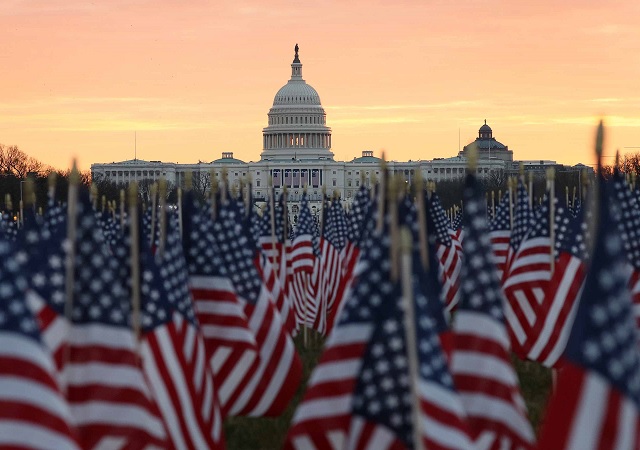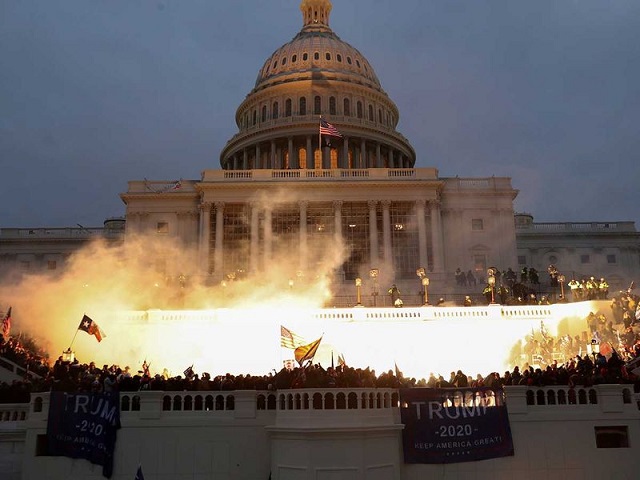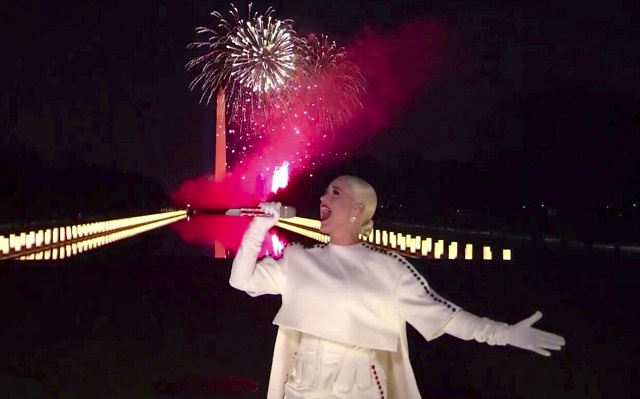An End to Myth: For a New American Language Ideas
Ideas, New in Ceasefire - Posted on Thursday, January 21, 2021 16:00 - 0 Comments

(Credit: Agencies)
The morning before the Capitol was stormed, I woke up to hopeful margins in Georgia’s US Senate runoff election. I had been in Atlanta for the past month canvassing for the democratic candidates, Raphael Warnock and Jon Ossoff. Their victories, the power built over years by youth, people of colour, and immigrants to flip a stubbornly red Georgia — this too, like the costumed hostage-taking Trump loyalists, was a picture of America. Had it all played out on a theatre stage, a critic would have lambasted such a contrived juxtaposition of events. Yet there is nothing more American than the tragicomic timing of that day: an armed Confederate insurrection following on the election of only the second Black US Senator from the South since our short-lived so-called Reconstruction.
Uncomfortable as it is to see the country unmasked, we have mostly accepted by now that the mask is all that holds together a union of 50 states, of hundreds of millions of individuals, with such diverse and often opposed values and identities. The whiplash — victory colliding so speedily with embarrassment — is just an iteration of the sort of forced compromise that is the basis of our union, like allowing a free state only when balanced by another where slavery could rule freely. In his inaugural address, President Biden suggested our country hasn’t always been pulled by such extremes, that there was a time when what moved us were “the common objects we as Americans love, that define us as Americans.” Of course, if an entire people can be defined, it couldn’t possibly be by the vague nouns he offered: “opportunity, security, liberty, dignity, respect.” But even if they could be the basis for united American action, Biden’s claim that “we have never, ever, ever, ever failed in America when we’ve acted together” was a grandiose triviality, for when have all Americans acted together? In this country, there is no protest without a counter-protest, no left without a right; and now no election without cries of fraud, conspiracy, and reactionary violence.
Despite the quintessential Americanness of the oscillating delight and fury on display the day the Capitol was stormed, Congresspeople returned to their chambers that evening assuring us that the afternoon had been an anomaly. Their speeches were rooted in ahistorical, unfounded fantasies, chapters in the larger American myth, painkillers at best, hooking us on false narratives while doing nothing to suture our festering wounds. Rep. Budd of Texas asserted that “violence is not representative of this country,” claiming instead that “peaceful debate — that’s the American way.” His fellow Republican, Sen. Sasse of Nebraska, said simply of the armed siege, “What happened today isn’t what America is,” never mind that the culprits had been aided by law enforcement and egged on by Trump himself, whose positions Sasse had voted for 9 times out of 10 while in the Senate. That night was full of these proclamations, both sides embracing romantic and hackneyed notions of what America is and is not, long on rhetoric, and short on evidence. For the evidence wouldn’t even show an America — the cleavages of the Civil War having only morphed, not disappeared — let alone an America that can be said to be one thing or another, least of all peaceful.
*** ***
The myth of America really needs no retelling, just as no one needs to show us the ground we walk on. In 1947, Sartre wrote of Americanism, calling it “a huge complex of myths, values, recipes, slogans, figures, and rites,” saying that it is not in us, but that we are in it, trapped. Of us and this myth, he said, “They struggle against it or they accept it, they stifle in it or go beyond it, they submit to it or reinvent it, they give themselves up to it or make furious efforts to escape from it; in any case it remains outside them, transcendent, because they are men and it is a thing.” Our shared myth begins with the name itself: there is of course no country called America; even the country for which America has become a stand-in is named after, of all things, that object of undying American scorn, a European. Wherever it began, the myth has no end. It swallows up whole eras of history, eliding the ugly and the evil, pronouncing purity and unearned pride in their place. As a friend of mine says about Whiteness, the myth of America is one hell of a drug.
“I just think we’ve gone too far in the other direction”, runs the line, referring to the year’s mounting demonstrations and demands to end the police killings of Black Americans. I heard a version of it at many doors in Georgia, at the homes of Republicans whose addresses ended up on my list by accident, but from Democrats too; in both cases, White people by and large, but not without exception. Such is the deep, dark work of our shared mythology that Americans’ internalised acceptance of compromise, some imagined notion of equilibrium, is common across lines of party and race, even when it requires that progress be titrated with injustice. The billboards along I-75 out to the suburbs said simply “Save America” in the familiar red-white lettering of a MAGA hat. When “too far in the other direction” is a euphemism so weak it can hardly disguise “uppity Blacks have got enough,” then “Saving America” means the summer of BLM protests can only swing back towards a winter of White backlash.

Hinging on the narrative of Equality, that great tributary to the grand national myth, “too far in the other direction” requires the belief that at some point before this summer America had achieved equality. Such rationalisation assumes that it was Obama’s election, or else perhaps the candidacy of Kamala Harris, that had finally made this dream a reality; or maybe by “dragging White people down” we had gotten to a lowest common denominator version of equality. Of course, the Black Lives Matter movement and the surge of protests this past summer demonstrated the persistent, violent inequality at work in the police departments from sea to shining sea. Inequality — not just happenstance, but institutional — is the characteristic trait of American peoples, despite the self-evident truths that we are told gave birth to our nation.
But facts do not matter to myth. As Roland Barthes put it, “Myth deprives the object of which it speaks of all History.” Shorn from history, reality — facts — “all that is left for one to do is to enjoy this beautiful object without wondering where it comes from.” America the Beautiful.
*** ***
It is by calling on the myth of America, and not American history, that congresspeople can make claims about its inherent peacefulness. This trading of history for myth is nowhere clearer than in the Trump administration’s recent, and already rescinded, 1776 Report, where we learn that “[t]o be an American means something noble and good” and that policies born of the Civil Rights Movement are unamerican. Myth, according to Barthes, is a kind of language, and our politicians speak it fluently. If it seems that the public words of politicians — speeches, debates, elections — are ever more meaningless, it’s because their language enthrals but its lofty turns of phrase are themselves neither verifiable nor falsifiable: they can only be accepted at shallow face value.
Our history, as Richard Kreitner documents in his recent Break It Up, is one of factions, short-term negotiated settlements, and acrimony. Ours is a union that since its founding has only barely held the weight of its contradictions, a complexity that myth is not deep enough to hold. Instead, it requires “banishing from national consciousness any recognition of competing demands and incompatible interests,” as Krietner puts it. This kind of repression, he notes, is what Freud (writing in 1923, the early days of Hitler’s rise to power, an ascent which didn’t require a war, but democratic elections) likened to a “patient at war with himself.” If we are preoccupied lately with the question of when we may see another civil war, it is likely because we are suffering too much to see that we already are in one. Biden himself acknowledged this in his first speech as president, urging us to “end this uncivil war that pits red against blue,” more than a decade after his former boss famously waxed on about how there were no red or blue states, only the United States.
*** ***
Even Trump, adored by so many for his supposed no-filter frankness, doesn’t speak plain English unadulterated by the mystifying dialect of myth. If anything, his political habit of speech that proclaims to “tell it like it is” is ideal for spinning myth, particularly in the mouth of a would-be autocrat whose devotees don’t demand explanations so much as seek to manufacture them (via the right-wing assembly line of Fox, QAnon, and countless individual co-conspirators). Barthes demonstrated how propaganda, be it a mere slogan or a single image, can by way of myth symbolise, in his case study, French imperialism, making it seem so natural that it “goes without saying.” Through the sort of myth he analysed, “things appear to mean something by themselves,” without even reference, explanation, or history. So too in our time, simple phrases — ‘ballot harvesting’, ‘national debt’, ‘Hunter Biden’s emails’, etc. — have become concepts laden with ideology and emotion, yet leave no trail of how they have themselves been, in Barthes’s words, fabricated by human acts. Not even Homer could have done as much to enlarge the store of American myth as Trump, and the latter’s retellings will not easily fall away.
A true tells-it-like-it-is dialect would be less about the telling of things — their mythology — and would instead centre on the real, material it. A dialect rooted in this sort of materiality would be directly opposed to myth, for in Barthes’s final analysis, “myth is depoliticized speech.” Its final aim is nothing less than to immobilize us and paralyze our political movement. Marxism, and revolutionary thought in general, are rooted not in mythological concepts but in the material conditions of human life, for it is by continually working the material of the world that it becomes what it is and we what we are. Myth, on the other hand, serves power. Language (and the country and selves we understand by way of it) is so thoroughly imbued with myth that each time we use it, we restrain ourselves on behalf of authority. Myth narratives — like bootstraps and individualism of all kinds — set in and warp our own epistemologies over time. They confuse and diffuse our efforts to build power, because organising requires an intention and momentum that myth precludes.
*** ***
As we rehearse myths back to ourselves and to the State, they take the shape of a national religion, and just like religion to Marx, they become “the sigh of the oppressed… the opium of the people.” We sit in the pews whispering proverbs while the State interprets the verse and lays down the law. And law is a language unlike myth: it is remote, esoteric, wielded only by a trained class and always for political ends. While myth immobilises with ornate narrative, law flexes through the technical grammar of legislation, lobbying, and loopholes. It moves huge sums of our money to arms dealers, moves millions of Black men into for-profit prisons, and in permitting fracking even moves mountains. A vernacular of similar precision could pierce through myth, reveal the grotesque machinery of the status quo that it fuels, and be a tool of disassembly and remaking.

Katy Perry performs during the Celebrating America event on Wednesday, Jan. 20, 2021, following the inauguration of Joe Biden as the 46th president of the United States. (Biden Inaugural Committee via AP)
Can we learn to speak this kind of language? “Revolutionary language proper cannot be mythical,” Barthes insisted, but outside of total upheaval, attempts to excise myth from our language led him to absurd, even nihilistic ends. He was not very hopeful about the prospect because in bourgeois culture myth “takes hold of everything,” and then it hides its own tracks, making its political and aesthetic values disappear beneath the surface of things: myths become known to us as nature. If there is hope, it may lie in studying the subtle signifying loops on which myth relies for its power, where and how they are embedded in social structures, and popularising a program of unlearning them. Finding history where it was camouflaged to blend with nature is a lesson in unlearning, making the archivist’s tools not backward-looking but world-making.
The eradication of history from myth in Barthes’s model carries a corollary: that man has wrought nothing, and so evades responsibility for everything. Refocused on the material conditions of human life, our language would refer transparently; rather than hiding its work like myth, it would make itself plain in its demands on power. Responsibility would not disappear under the spell of myth, but would articulate itself as in a contract. Like the polyglot language of myth itself, our language can transcend the oral or written. For example, rather than being passive consumers of images, Ariella Aïsha Azoulay suggests that relearning the language of photography ought to be a “civic skill.” She even outlines a lexicon decipherable in a series of images from the January 25 revolution in Egypt, where “gestures, combined with others, are articulated in a civil syntax.” Rather than reaching Barthes’s conclusion of the impossibility of demythologised language outside revolution, it may be that unearthing our material language from the clinging artifice of myth is a precursor to meaningful political progress.
*** ***
The morning after the Georgia runoff, even before hearing about the events at the Capitol, my relief was tempered by the familiar sense that we had come through by the skin of our teeth, capturing a Senate majority on a technicality. We’d won, but Biden’s party employs the same American myth narratives as its opponents, and its policymaking is muted and restrained as a result. My sense of victory that morning hung in the same foreboding and tenuous air as the defeat I’d felt after Trump’s election four years earlier. That air hung heavy over the National Mall yesterday, surrounded by tanks, all roads leading to it blocked until Harris and Biden had been sworn in and securely removed. His back to the Capitol, on a scaffolding of mythology reserved for presidential inaugurations, Biden invoked another great American storyline, assuring us that “the dream of justice for all will be deferred no longer.” But is it too late — when Langston Hughes suggested in terse, ominous italics that a dream deferred may explode, did he mean to imply it could still be rescued? Even if it ends up a quiet implosion, myth hurled upon myth, the wreckage could be worse for waiting. US Youth Poet Laureate Amanda Gorman’s poem for the inauguration spoke of optimism, a new president heralding its titular new dawn. Yet she also warned that “inaction and inertia will be the inheritance of the next generation” if we cannot move to radically rebuild the material of our world. Once we can close our ears to the paralysing language of myth, may the rebuilding begin.



Leave a Reply